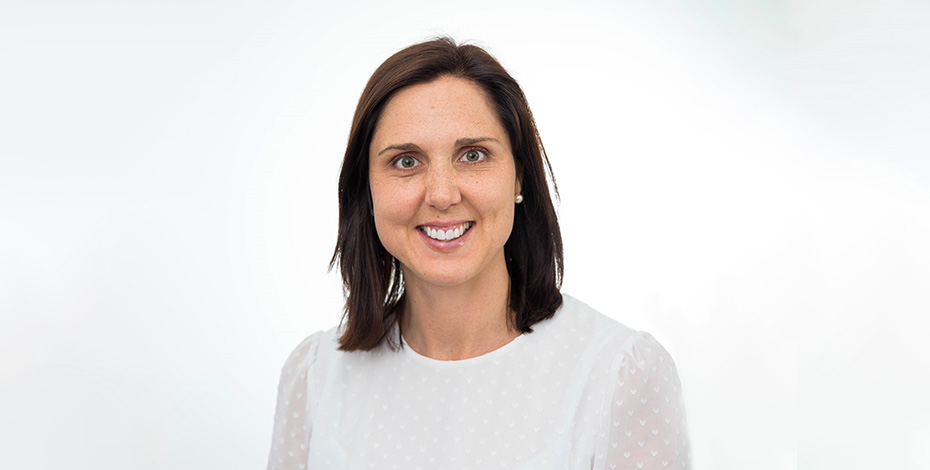
Going full circle

PHYSIOTHERAPY RESEARCH FOUNDATION The Physiotherapy Research Foundation is celebrating 35 years of supporting physiotherapists. Here, Kate Moore talks about her research and clinical practice.
With plenty of clinical years still ahead of her, Kate Moore APAM MACP describes her career as going full circle—from physiotherapy patient as a teenager to balancing her working week as lead physiotherapist for the Tasmanian Institute of Sport and as a clinician in Hobart.
‘Like many physios, as an adolescent who loved sport I spent a lot of time at physio.
'However, it was a last-minute choice in year 12 to put physiotherapy as my first preference and 20 years on I’m exceptionally glad I did.
'Four years after graduating, I returned to Hobart and started working with Kellie Wilkie APAM MACP, the physio who inspired me to pursue this as a career.
'I have now worked in the same private practice where I first started as a patient, Bodysystem, for 12 years.’
Kate graduated from La Trobe University with honours in 2007, completed a Master of Sports Physiotherapy in 2014 and became an APA Sports and Exercise Physiotherapist in 2015.
In 2020, she achieved a ‘career highlight’ when appointed as lead physiotherapist for the Australian women’s water polo team for the Tokyo Olympics (the Aussie Stingers finished fifth).
Kate is also a recipient of a Physiotherapy Research Foundation grant, awarded in 2013 for ‘an exploration of the feasibility of a randomised trial for physiotherapy in early hip osteoarthritis following hip arthroscopic surgery’. The grant enabled a clinical trial to be conducted at Bodysystem, funding physiotherapists to see patients for appointments.‘
'This is common practice these days. However, 10 years ago, it was not a usual model for running a trial,’ she says.
The trial indicated that a randomised controlled trial was feasible to determine the
efficacy of physiotherapy intervention post-hip arthroscopy to improve patient outcomes.
‘We were seeing a large population of patients for rehabilitation following hip arthroscopies.
However, there was no level 1 evidence to support physiotherapy intervention after this type of surgery.
With a very supportive orthopaedic surgeon in Mr Michael Pritchard as well as experienced supervisors in Associate Professor Jo Kemp FACP (a former director of Bodysystem) and Professor Kay Crossley APAM MACP, I applied for the Beryl Haynes Memorial Fund Research Grant through the Physiotherapy Research Foundation.
Beryl was a trailblazer in physiotherapy in Tasmania and I am proud to have been a recipient of the grant in her name as a fellow Tasmanian female physiotherapist.’
Without the Physiotherapy Research Foundation, it wouldn’t have been feasible to run our study through our practice and to use clinicians as trial physiotherapists. KATE MOORE
The study is an example of the impact interdisciplinary collaboration can have on achieving successful patient outcomes.
‘Physiotherapists are excellent at exercise prescription as this is the cornerstone of our practice. With experience I have come to realise the importance of patient interaction and communication with all parties involved in a patient’s care.
'I am a huge advocate of interdisciplinary teamwork for both sporting and non-sporting patients.
'This model, which features excellent communication between all professionals and includes the patient or athlete in decision-making, is true patient-centred care.’
Kate acknowledges the importance of grants in supporting research to improve clinical practice.
‘Bodysystem’s clinical practice is guided by research.
'But it’s important that the research is guided by the questions that come up in our clinical practice, which is why physios who wish to pursue research need to maintain contact with the clinical setting.
'That’s why grants are important.
Without the Physiotherapy Research Foundation, it wouldn’t have been feasible to run our study through
our practice and to use clinicians as trial physiotherapists.
Mentors and a supportive work environment are also key to achieving professional success.
‘I’ve been surrounded by some phenomenal women.
'I’ve been led by Professor Jill Cook APAM MACP for my honours thesis and by Jo and Kay for the grant. In my working mix, I get to mentor younger physiotherapists at Bodysystem, a business I truly love and believe in that is owned by two outstanding women.
'At the Tasmanian Institute of Sport, I love working with elite, sub-elite and developing athletes, learning to manage their health and helping to achieve their performance goals.
'With two young children at home, I have such a great balance.’
© Copyright 2024 by Australian Physiotherapy Association. All rights reserved.





